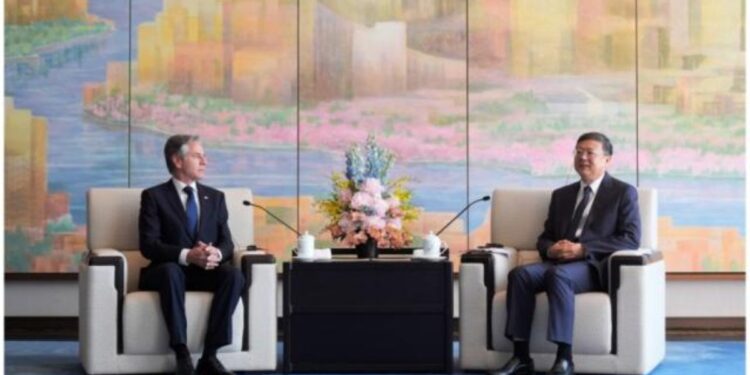The recent progress made in U.S.-China relations is beginning to unravel due to Beijing’s backing of Russia in the Ukrainian conflict.
Despite the reestablishment of communication between Washington and Beijing, which has been praised since late last year, the United States is displeased with China’s increasing involvement in the Russia-Ukraine war. More specifically, the U.S. is concerned about China’s commercial support of Moscow’s military production.
The Biden administration seeks to employ fresh sanctions as a diplomatic tool to prevent China from providing Russia with drone and missile technology, satellite imagery, and machine tools. This assistance only strengthens the Kremlin’s military capabilities, more than two years after its invasion.
Secretary of State Antony Blinken is currently on a three-day diplomatic trip to Beijing, which is set to conclude on Friday. During his visit, he intends to convey a firm message to the world superpower: sever ties with the Kremlin or face the repercussions.
Jonathan Ward, a senior fellow at the Hudson Institute think tank in Washington, D.C., emphasized the importance of using U.S. diplomatic channels to exert pressure on Beijing. He pointed out that the Chinese Communist Party has provided extensive support to Russian President Vladimir Putin, both before and after his invasion of Ukraine. This support includes direct assistance in rebuilding Russia’s military industrial base. Ward believes that it is crucial to leverage diplomatic means to address this issue and apply the necessary pressure on Beijing.
“We must exert substantial economic pressure on China, and Secretary Blinken should be the one to deliver this message to his counterparts in Beijing,” he emphasized.
During Blinken’s visit, he will continue the ongoing communication between President Biden and Chinese President Xi Jinping. This commitment to regular communication extends not only between the two leaders but also among their senior officials. In fact, they recently had a phone conversation earlier this month.
Last week, Defense Secretary Lloyd Austin engaged in a significant conversation with his Chinese counterpart, marking the first high-level military dialogue between the United States and China in almost two years. According to a senior Defense official, the purpose of the call was to maintain a balance between competition and avoiding any potential conflicts with China.
After Treasury Secretary Janet Yellen led an economic delegation to Beijing in early April 24, 2024, Chinese state media praised the visit.
The U.S. administration recently started publicly addressing China’s export of military equipment to Russia, emphasizing that supporting Putin’s actions in Ukraine is a definite boundary for the U.S., similar to how China perceives Taiwan as its own territory.
During a town hall hosted by the National Committee on U.S-China Relations earlier in April, Deputy Secretary of State Kurt Campbell expressed a direct message to China, stating that the ongoing offensives by Russia and their territorial gains in Ukraine will have an impact on the U.S.-China relationship. Emphasizing that the United States will not simply stand by and pretend everything is fine, Campbell made it clear that action will be taken to address the situation.
According to U.S. Ambassador to NATO Julianne Smith, there is currently no evidence to suggest that China is supplying weapons to Russia. However, Beijing’s support for Moscow does extend to nonlethal equipment, such as drone technology, as well as supplies like gunpowder ingredients, machine tools, microelectronics, and nitrocellulose, which can be used as a propellant. This information was shared by Smith in an interview with Politico.
According to her, this type of technology, known as “dual-use,” has the potential to be used in both civilian and military settings, and it is currently being utilized by Putin’s army.
China has consistently maintained that its exports comply with international laws and regulations. Liu Pengyu, spokesperson for the Chinese Embassy, emphasized that China’s right to engage in normal trade and economic exchanges should not be undermined or disrupted.
In a statement, Liu emphasized that China bears no responsibility for the Ukraine crisis and is not involved in it. He stated that China does not engage in provocative actions or pursue self-interest, and it certainly will not accept being blamed for the situation. Liu criticized the United States for continually making baseless accusations regarding China’s regular trade and economic interactions with Russia, all the while providing significant aid to Ukraine. China firmly rejects these accusations and their implications.
In anticipation of his visit, Blinken offered a glimpse into his discussions with China, stating to journalists that China is presently the main contributor to Russia’s military industrial base.
During a meeting of leading world economies in Italy, Blinken expressed his concerns about China’s contradictory stance. He stated, “If China claims to seek good relations with Europe and other countries, it cannot simultaneously contribute to the biggest threat to European security since the end of the Cold War.”
U.S. officials have also issued warnings about imposing severe sanctions on Chinese companies if they continue to send nonlethal supplies to Russia.
Blinken’s most recent visit to China took place in June, marking the end of almost a year of limited communication between American and Chinese officials. This period of silence began when former House Speaker Nancy Pelosi (D-Calif.) visited Taiwan in August 2022. Originally planning to travel to China earlier, Blinken had to cancel his trip due to a Chinese spy balloon incident that occurred just days before his departure. This unexpected event once again disrupted the ongoing dialogue between the two nations.
In the five months since Biden and Xi met, the relationship has become more stable, with China reducing military drills around Taiwan.
According to Ward, if the United States wants to see a change in China’s behavior towards Russia, it needs to follow through on its threats.
According to Ward, if there is any dialogue between the US and China, it cannot avoid addressing the real-world issues of global competition between the two nations. One of these issues is the need to clarify and demonstrate the consequences of supporting Putin, something that China is likely to continue doing.










